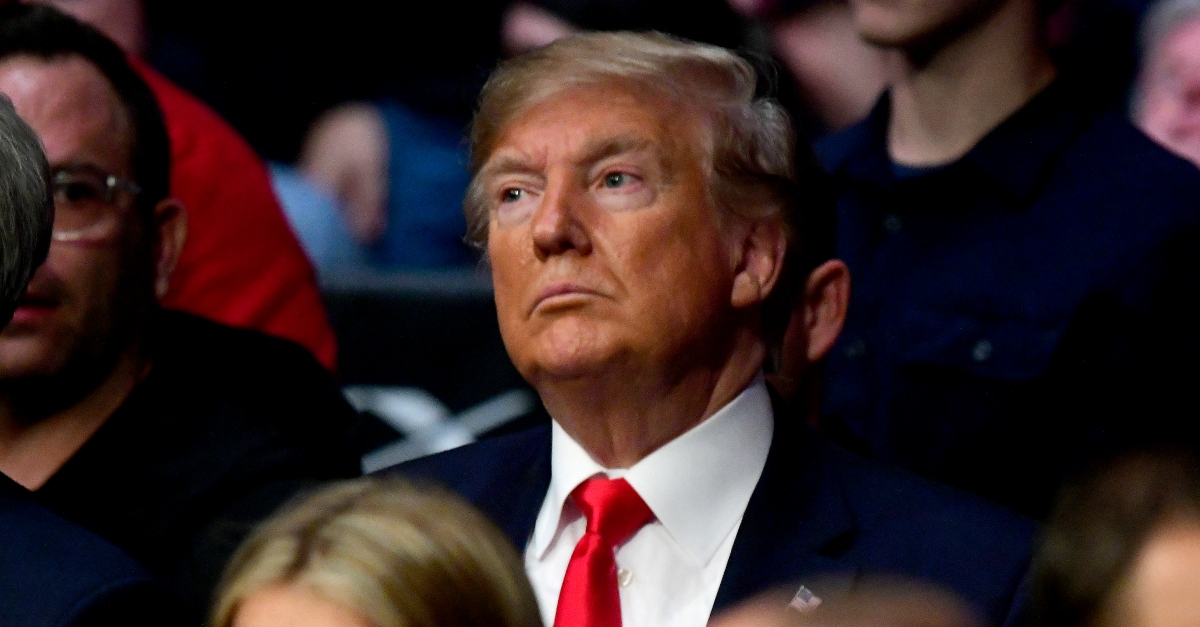by Colin Kalmbacher | March 27th, 2020

Attorneys for President Donald Trump filed a series of reply briefs with the Supreme Court on Friday in response to two ongoing lawsuits targeting his tax returns and other financial information.
The arguments advanced in those court documents by the 45th president suggest a general and wide-ranging aversion to investigative powers being wielded by the congressional branch.
“Congress does not get the benefit of the doubt when it issues an unprecedented subpoena for the President’s private papers on the assertion that might be useful in considering legislation,” one such filing reads. “To the contrary, the Court should harbor serious doubts that the subpoenas are within the Committees’ power to issue.”
Enforcing the duly-authorized congressional subpoenas issued by the House Oversight Committee would require “total deference to Congress,” according to Trump and his legal team.
The filing goes on like this for some time–using sweeping language to bat away generally non-controversial understandings of the congressional subpoena power and enforcement authority.
“The Committees concede that the subpoenas are meant to uncover and expose whether the President has engaged in wrongdoing,” the House-focused reply brief continues. “Their argument that such an avowed law-enforcement purpose is legitimate so long as they also proclaim a generalized interest in examining the adequacy of existing laws is meritless. Unless the primary purpose of the subpoenas controls, the Committees have carte blanche to engage in law enforcement.”
Critics assailed the president’s legal arguments.
“The president’s lawyers are determined to make clear that no person or entity has any authority to conduct oversight of the president to which he has not consented or over which he himself does not have control,” national security Bradley P. Moss told Law&Crime via email. “In the president’s view, the only lawful mechanisms that can restrain him are political actions of impeachment and election voting.”
House Democrats have long sought Trump’s tax returns and other information related to his finances–which is currently in the possession of the president’s accounting firm Mazars USA, LLP. The firm was served with a subpoena on April 15 2019 and Trump quickly sued to stop the company from providing the congressionally-requested documentation.
In October of last year, the D.C. Court of Appeals cited the Watergate scandal, its resulting legislation, and a case brought by a Senate Select Committee seeking Richard Nixon’s documents in order to validate the congressional request for Trump’s tax returns.
The Second Circuit followed suit less than a month later–in a similar case filed by New York County District Attorney Cyrus Vance.
Legal wrangling continued and the president ultimately appealed to the Supreme Court in order to keep his financial information from ever seeing the light of day–congressional subpoenas notwithstanding.
Friday’s filing makes no secret that the president disagrees with the validity of those subpoenas because Congress intends to use the requested information to ferret out whether or not the president has broken any laws.
Again the Committee-focused reply brief:
There is overwhelming proof that the primary purpose of the Committees’ subpoenas is to gather and expose evidence about whether the President violated various laws. And the Committees do not disagree; they double down. In the Committees’ view, the point of these subpoenas is to track down the President’s “alleged ties to criminal organizations or money laundering,” find out whether the President’s “‘real estate projects were laundromats for illicit funds from countries like Russia,’” uncover if the President’s properties were used to “launder…large sums of money for more than a decade,” determine whether the President is in “compliance with the Ethics in Government Act and the Emoluments Clauses,” and, ultimately, investigate “whether the President may have engaged in illegal conduct before and during his tenure in office.”
Citing a dissenting opinion by Trump-appointed Judge Neomi Rao as the legal foundation for their argument, the president’s attorneys claim there is “no basis…for allowing Congress to conduct ‘a roving inquisition over a co-equal branch of government’ to uncover and expose evidence of presidential wrongdoing.”
The Trump response to a separate case originating out of the Manhattan District Attorney’s Office relies upon a wholly different slate of arguments. Chief among these is the argument that the president is entitled to immunity but isn’t unaccountable.
Per the second reply brief:
Immunity does not place the President “above the law.” It “merely precludes” one specific “remedy for alleged misconduct in order to advance compelling public ends.” The Constitution is our supreme law. The District Attorney violated it by issuing this subpoena.
[image via Steven Ryan/Getty Images]
No comments:
Post a Comment